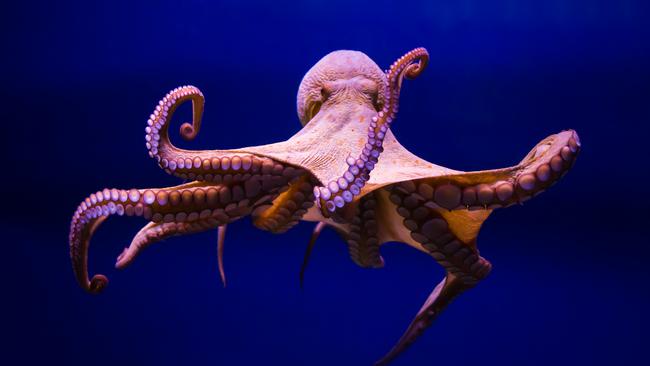Other Minds: The Octopus and the Evolution of Intelligent Life
Vertebrates, octopuses and cuttlefish are the only members of the animal kingdom to possess a large brain.

In all the history of life on Earth, evolution has given rise to large brains on just three occasions. The first occurred in the lineage leading to the vertebrates (including ourselves), the second in that leading to the octopuses and the third in that leading to the cuttlefish.
Because octopuses and cuttlefish evolved their large brains independently from ourselves, and from each other, their intelligence can be viewed as genuinely alien, and for Australian philosopher Peter Godfrey-Smith, who is interested in the evolution of the mind, that makes them irresistible subjects for research.
One great advantage octopus and cuttlefish have for researchers is that, because they display their emotional state on their skin, they are easy to read. So illustrative and instantly reactive is the skin of a cuttlefish that Godfrey-Smith refers to it as a “video screen”. When angry, cuttlefish can put on murderous-looking displays, appearing rust-red and all “horns and sickles”. But they also can reflect curious, elusive or quietly thoughtful states that, with experience, researchers can recognise.
How intelligent are octopus and cuttlefish? Little is known of cuttlefish intelligence, but since the time of Pliny the Elder octopus have been respected as crafty creatures. For almost two millennia — until video cameras recorded an octopus in a laboratory leaving its aquarium to attack prey in other aquariums — Pliny was disbelieved for his record of octopuses leaving the sea to raid the factories where ancient Romans made their fish sauce.
Such behaviours can easily be anthropomorphised, and indeed in Other Minds: The Octopus and the Evolution of Intelligent Life, Godfrey-Smith talks about the octopus and cuttlefish he studies in very human terms. They can be “friendly” or “curious”, and he says of one octopus that it “looked up at me with an expression that I cannot describe at all except to say that he seemed deeply unimpressed”. Godfrey-Smith is hardly alone in doing this. Indeed, there is a growing trend to view octopus as fellow intelligences, and at the very least to remove them from our menus.
Despite the fact Godfrey-Smith’s book bears an image of an octopus on its cover, it is about far more than octopuses. Above all, Godfrey-Smith is interested in the emergence of consciousness — which he defines as meaning that life feels like something — and large parts of the book are technical investigations of this elusive phenomenon.
Animals, he explains, can do highly complex things but this does not mean they are conscious. Because Godfrey-Smith thinks consciousness is a “mixed-up and overused but useful term”, he tends to concentrate on the degree to which a creature’s nervous system is integrated. Integration is a precondition for consciousness, and its extent in various creatures can be demonstrated experimentally.
For example, octopuses trained to do a task using just one eye cannot, at least without great repetition, do the task using only the other eye, indicating that the two halves of their brain are not well integrated.
But even we indubitably self-conscious beings do not possess entirely integrated nervous systems, as is illustrated by the fact we do a great deal — from breathing to digestion — unconsciously.
In Godfrey-Smith’s view, consciousness has been built on the foundation of subjective experiences such as pain; beginning with life forms such as a jellyfish that can co-ordinate itself, but that he thinks is “a form of animal life that feels like nothing at all”. In his view there are no sharp divides in the evolution of consciousness, only many gradations.
To return to octopuses, Godfrey-Smith demonstrates that their brains, and hence their intelligence, are very different from our own. One fundamental difference is that much of the octopus nervous system is housed not in their brain but in their tentacles.
This means that each tentacle can probably act independently from the creature’s central control system. It appears unlikely, therefore, that octopuses have a sense of self anything like our own. But even such knowledge cannot dispel the sensation, when looking an octopus in the eye, that you are engaging with a sentient being.
Octopus and squid have been around for 270 million years — long enough surely to develop an octopus civilisation. You might think that displaying your state of mind on your skin would be a huge advantage, for it’s the equivalent of having a complex and ready-made language system. Humans, by comparison, are poorly endowed with means of communication.
Yet it is us, rather than the octopus, who have developed organised societies. Octopuses and cuttlefish have remained largely solitary, except during the mating season or in special circumstances where they are forced to share space.
Part of the reason that octopus societies do not exist may lie in the astonishing fact both octopuses and cuttlefish appear to be colour blind. This means they cannot see their own or each other’s displays. Just why the displays exist remains mysterious. Perhaps they have some unrecognised means of “seeing” colour, or perhaps their displays solely serve other purposes, such as camouflage, and the reflection of their moods externally is incidental.
Both octopuses and cuttlefish share one other great disadvantage relative to most vertebrates: they live exceedingly brief lives. Even the giant cuttlefish, which can reach almost 2m in length, lives for only two years, and almost all species breed only once, dying shortly after mating and long before their young have hatched from their eggs.
The disadvantage of this system is twofold: they have limited time to learn about their world and parents cannot teach their offspring. The result is that there is no octopus culture, nor society. Just solitary, highly capable and intelligent animals, the workings of whose minds remain a profound mystery to us.
Peter Godfrey-Smith will be a guest of the Sydney Writers Festival, from May 22 to 28.
Tim Flannery is a scientist and author.
Other Minds: The Octopus and the Evolution of Intelligent Life
By Peter Godfrey-Smith
HarperCollins, 272pp, $44.99 (HB), $27.99 (PB)


